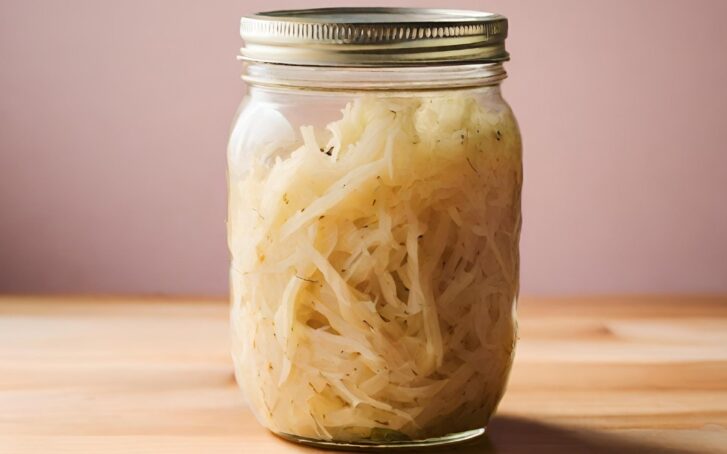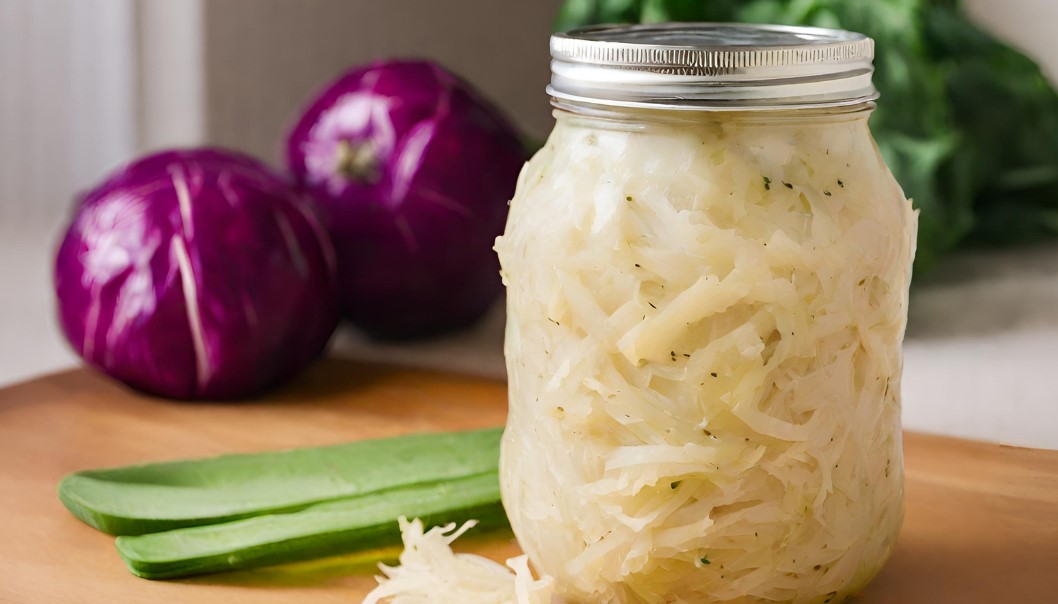It’s Jennifer Foster again. Today, I’m excited to share my insights on a topic that’s close to my heart: the best time to eat sauerkraut for optimal gut health.
Having spent years studying the effects of diet on digestive wellness, I’ve come to appreciate the incredible impact that simple dietary choices can have on our overall health.
Sauerkraut, a humble yet powerful fermented food, is a perfect example of this. It’s not just about what we eat, but also when we eat it, especially when it comes to foods rich in probiotics, in a variety of strains.
Today, I want to provide you with the most important things you should know about sauerkraut. Without further ado, let us begin.
Best Time to Eat Sauerkraut for Gut Health
The optimal time to consume sauerkraut for maximizing its gut health benefits is a subject of considerable importance. Consuming sauerkraut either during or before a meal is highly recommended.
This specific timing plays a pivotal role in enhancing the digestive process. One of the conditions it can help is a leaky gut. When we consume food, our stomach responds by producing gastric acid and digestive enzymes.
These substances are essential for breaking down the food into absorbable components. The acidic environment of the stomach not only facilitates digestion but also serves as a barrier, killing potentially harmful bacteria present in the food.
Introducing sauerkraut into the diet at these strategic times – before or during a meal – is beneficial for several reasons. Firstly, the probiotics introduced into the stomach at a time when they are most likely to survive the acidic conditions.
The presence of other food items, like pickles, can buffer the stomach’s acidity, providing a more hospitable environment for these beneficial bacteria to pass through.
Once they survive the stomach, these probiotics can then continue their journey to the small intestine, which is their primary site of action. In the small intestine, these probiotics can exert their beneficial effects more effectively.
They help in restoring and maintaining a healthy balance of gut microbiota. This balance is crucial for various aspects of health, including efficient digestion, nutrient absorption, and immune function.
A healthy gut microbiome is also associated with reduced inflammation and improved mental health, highlighting the systemic impact of gut health. Consuming it with meals can aid in the digestion of the meal itself.
The enzymes and probiotics in sauerkraut can help break down the food more efficiently, leading to better nutrient absorption and reduced digestive discomfort.
This is particularly beneficial for individuals who may experience bloating, gas, or indigestion after meals. It’s also worth noting that the timing consumption can vary based on individual digestive health and preferences.
While eating it before or during meals is generally beneficial, some people might find that their system tolerates it better at different times.
For instance, those with sensitive stomachs might prefer consuming a small amount as a standalone snack between meals.
This approach can introduce probiotics into the system in a more gradual manner, reducing the likelihood of digestive upset.
Health Benefits of Sauerkraut
Sauerkraut stands out as a superfood with a multitude of health benefits. These probiotics, which are beneficial bacteria, play a crucial role in various aspects of health, particularly in improving digestion and enhancing the immune system.
Improvement in Digestive Health
One of the most significant benefits of sauerkraut is its ability to improve gut health. The probiotics in sauerkraut help in maintaining a healthy balance of gut flora, which is essential for efficient digestion.
Regular consumption can lead to more regular bowel movements, thereby reducing the risks associated with chronic constipation. Additionally, it can alleviate common digestive issues such as bloating, gas, and indigestion.
The probiotics in sauerkraut also aid in the absorption of nutrients, ensuring that the body gets the maximum benefit from the food we consume. Pairing with yogurt can provide more benefits down the road.
Boosting the Immune System
Sauerkraut is a powerhouse of vitamin C and other antioxidants, which are vital for a strong immune system. These components help in the production of white blood cells and antibodies, which are the body’s first line of defense against pathogens.
Regular consumption of sauerkraut can therefore help in reducing the frequency of common illnesses like colds and flu.
Anti-Inflammatory Effects
The anti-inflammatory properties of sauerkraut are another significant benefit. Chronic inflammation is a root cause of many diseases, including heart disease, diabetes, and certain cancers.
The antioxidants and probiotics help in reducing inflammation throughout the body, thereby lowering the risk of these conditions.
Weight Management
For those looking to manage their weight, sauerkraut is an excellent dietary addition. It is low in calories yet high in dietary fiber, which promotes a feeling of fullness and reduces the likelihood of overeating.
This can be particularly beneficial in weight loss or weight management plans.
Cardiovascular Health
The low fat and cholesterol content in sauerkraut make it heart-friendly. Regular consumption can contribute to lower cholesterol levels, reducing the risk of heart disease.
Additionally, the fiber in sauerkraut helps in managing blood sugar levels, which is beneficial for people with diabetes or those at risk of developing the condition.
Mental Health Benefits
Emerging research suggests a strong connection between gut health and mental health. The probiotics can have a positive impact on mental health by reducing symptoms of anxiety and depression.
This is attributed to the gut-brain axis, a pathway through which the gut communicates with the brain.
Considerations and Precautions
While sauerkraut is celebrated for its health benefits, it’s crucial to approach its consumption with mindfulness, especially for certain groups of individuals. Here are some considerations and precautions:
1. Histamine Intolerance
Sauerkraut contains histamines. People with histamine intolerance might experience allergic reactions, headaches, or digestive issues after consuming sauerkraut. Such individuals should be cautious and may need to avoid fermented foods altogether.
2. Autoimmune Disorders
The active microorganisms in sauerkraut can sometimes trigger an immune response. For those with autoimmune disorders, this could potentially exacerbate their condition.
It’s advisable to consult with healthcare professionals to understand if sauerkraut is safe for their specific condition.
3. Interactions with Medications
Particularly noteworthy is the interaction of sauerkraut with blood thinners. It is rich in vitamin K, which plays a role in blood clotting. This can interfere with blood-thinning medications like warfarin.
Additionally, for individuals taking supplements like D-mannose, commonly used for urinary tract health, it’s important to consider how the probiotics in sauerkraut might interact with these supplements.
4. Pregnancy and Breastfeeding
Pregnant and breastfeeding women should exercise caution. The high sodium content can lead to increased blood pressure, which is a concern during pregnancy.
Moreover, the presence of lactic acid bacteria and other microorganisms, while generally beneficial, can be unpredictable in how they affect a pregnant or breastfeeding woman’s body.
5. Sensitivity to Salt
Individuals who are sensitive to salt or are managing conditions like hypertension should be aware of the high sodium content in sauerkraut. Consuming it in large quantities could potentially lead to elevated blood pressure and associated health risks.
6. Listening to Your Body
Everyone’s body reacts differently to different foods. It’s important to start with small amounts of sauerkraut and observe how your body responds.
If you notice any adverse reactions like bloating, gas, or digestive discomfort, it may be wise to reduce the quantity or frequency of consumption.
Sauerkraut as a Superfood
Sauerkraut has garnered acclaim in the health and wellness community, often being labeled as a superfood.
This recognition is not without merit, as it boasts a rich nutrient profile and a host of health benefits, making it a standout in the world of nutritious foods.
Rich in Probiotics
The cornerstone of sauerkraut’s superfood status is its abundance of probiotics, which can be seen through CFUs. These beneficial bacteria are the product of the fermentation process.
They play a crucial role in maintaining gut health, aiding in digestion, and enhancing the immune system. Probiotics are also known for their ability to balance the gut microbiome, which is vital for overall health.
Traditional Fermentation Methods
The traditional methods of fermenting sauerkraut are what makes it particularly beneficial. These methods allow for the natural process of fermentation without the addition of artificial preservatives or chemicals.
During this process, the natural bacteria present in cabbage convert sugars into lactic acid, creating an environment where beneficial bacteria thrive. This process not only preserves the food but also enhances its nutritional value.
Raw and Unpasteurized
To reap the full benefits of sauerkraut, it is best consumed raw and unpasteurized. Pasteurization, while effective for prolonging shelf life, involves heating it to high temperatures, which can destroy many of the live cultures.
Raw, unpasteurized sauerkraut retains these probiotics, along with enzymes and other beneficial components that are crucial for gut health.
Nutrient Content
Sauerkraut is not only rich in probiotics but also packed with vitamins and minerals. It is an excellent source of Vitamin C, which is essential for immune function, skin health, and iron absorption.
It also contains Vitamin K, important for bone health, and B vitamins, which are vital for energy metabolism. The fiber content in sauerkraut aids in digestion and helps in maintaining a healthy weight. Table 1
FAQs
Should sauerkraut be eaten on an empty stomach?
Eating sauerkraut on an empty stomach can deliver probiotics more directly to the gut, but it may cause discomfort for some people. If you experience bloating or indigestion, try eating it with food instead.
Can I eat sauerkraut at night?
Yes, you can eat sauerkraut at night. However, if you have a sensitive stomach or experience indigestion, it’s better to consume it earlier in the day.
Does sauerkraut clean out your gut?
Sauerkraut contains probiotics that can help balance the gut microbiome, aiding in digestion and potentially ‘cleaning’ the gut by promoting healthy bowel movements and reducing bloating.
Is it better to eat sauerkraut before or after eating?
Eating sauerkraut before or during a meal is generally recommended. It can stimulate digestion and ensure that the probiotics survive the acidic environment of the stomach more effectively.
Closing Thoughts
I hope this discussion has illuminated the best times to incorporate sauerkraut into your diet for enhancing gut health. Remember, consuming sauerkraut during or before meals can significantly aid in digestion and the absorption of its beneficial probiotics.
As we’ve seen, it is more than just a condiment; it’s a superfood that, when consumed at the right time, can play a pivotal role in maintaining a healthy gut microbiome.
Related Posts:
- When is the Best Time to Take Collagen? According to…
- How Do You Fix a Leaking Gut: Gut Healing Simplified
- 10 Best Gut Health Supplements in 2024 - Expert Picks
- Probiotics and Mental Health: The Gut-Brain Connection
- What are Live Cultures: Gut Health Guardians
- 6 of the Best Types of Yogurt for Probiotics:…



















